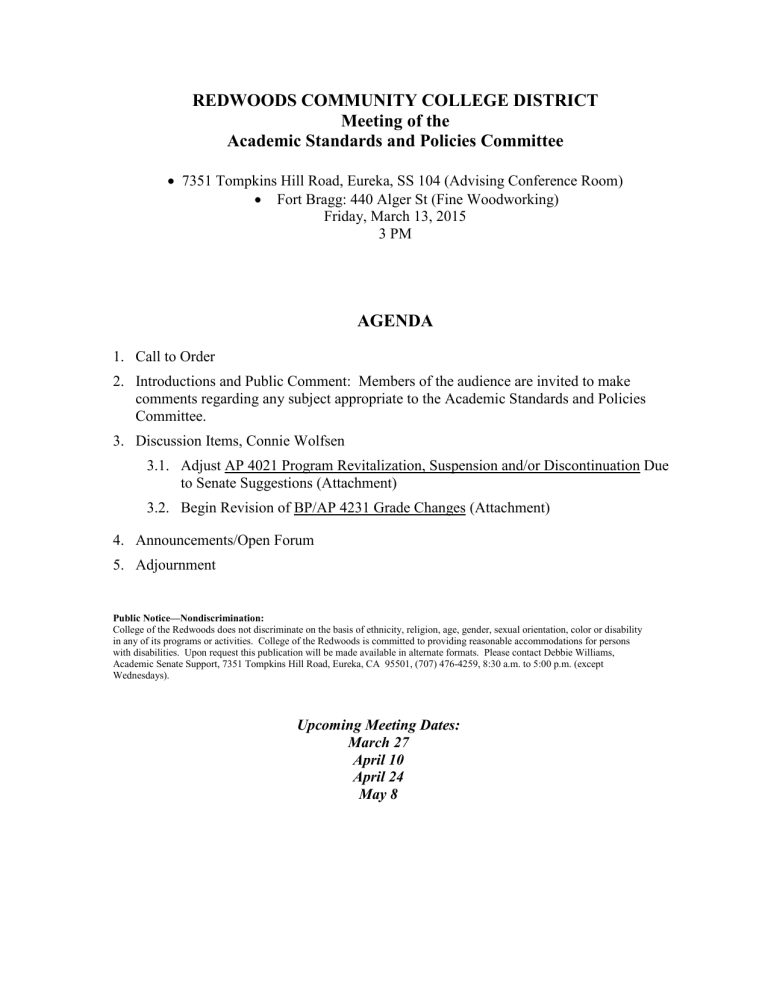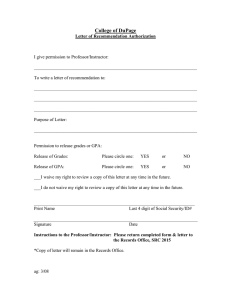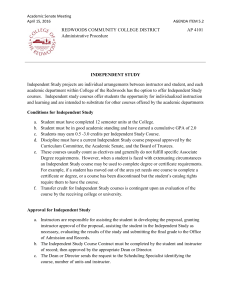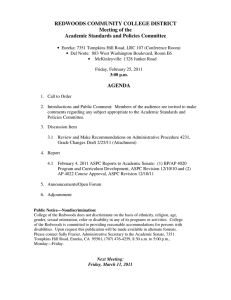REDWOODS COMMUNITY COLLEGE DISTRICT Meeting of the Academic Standards and Policies Committee

REDWOODS COMMUNITY COLLEGE DISTRICT
Meeting of the
Academic Standards and Policies Committee
•
7351 Tompkins Hill Road, Eureka, SS 104 (Advising Conference Room)
•
Fort Bragg: 440 Alger St (Fine Woodworking)
Friday, March 13, 2015
3 PM
AGENDA
1.
Call to Order
2.
Introductions and Public Comment: Members of the audience are invited to make comments regarding any subject appropriate to the Academic Standards and Policies
Committee.
3.
Discussion Items, Connie Wolfsen
3.1.
Adjust AP 4021 Program Revitalization, Suspension and/or Discontinuation Due to Senate Suggestions (Attachment)
3.2.
Begin Revision of BP/AP 4231 Grade Changes (Attachment)
4.
Announcements/Open Forum
5.
Adjournment
Public Notice—Nondiscrimination:
College of the Redwoods does not discriminate on the basis of ethnicity, religion, age, gender, sexual orientation, color or disability in any of its programs or activities. College of the Redwoods is committed to providing reasonable accommodations for persons with disabilities. Upon request this publication will be made available in alternate formats. Please contact Debbie Williams,
Academic Senate Support, 7351 Tompkins Hill Road, Eureka, CA 95501, (707) 476-4259, 8:30 a.m. to 5:00 p.m. (except
Wednesdays).
Upcoming Meeting Dates:
March 27
April 10
April 24
May 8
ASPC Meeting
Friday, March 13, 2015
Academic Senate Meeting
March 6, 2015
AGENDA ITEM 5.3
REDWOODS COMMUNITY COLLEGE DISTRICT AP 4021
Administrative Procedure
PROGRAM REVITALIZATION, SUSPENSION, OR DISCONTINUATION
Philosophy and Purpose
The College of the Redwoods District is committed to upholding the vitality and integrity of its educational programs through processes of regular and ongoing evaluation. This may lead to instances where there are concerns about program viability and that may cause a program to be recommended to the President/Superintendent for analysis. This procedure delineates a transparent and data-driven process to consider the relevant issues and to bring an appropriate and timely resolution regarding program revitalization, suspension or discontinuation.
Definition of a Program
An instructional program is defined as a discipline and/or as an organized sequence or grouping of courses leading to a defined objective such as a major (area of emphasis), degree, or certificate.
Consideration of Collective Bargaining Rights
Nothing contained in this Administrative Procedure is intended to infringe upon, diminish, or supersede any collective bargaining rights established for employees of the District.
Consideration of issues that fall under the scope of bargaining will be addressed through the regular processes established for such consideration by the District and its collective bargaining units.
Program Revitalization, Suspension or Discontinuation Evaluation Process
Step One: Program Analysis Request
Program revitalization, suspension, or discontinuance discussions can be initiated by administration, faculty, Program Review Committee or Academic Senate. The Program
Analysis Request (Appendix A) submitted to the appropriate Dean/Director shall be forwarded to the Chief Instruction Officer/Chief Student Services Officer (CIO/CSSO). The
Academic Senate Co-Presidents shall be consulted on whether to move the recommendation forward to the President/Superintendent.
Step Two: Appointment of the Task Force
If a Program Analysis Request is approved by the President/Superintendent, a task force will be appointed. The Task Force shall be composed of the following:
•
One Dean or Director not connected to the program
•
One Academic Senate Co-President or their designee
Page 3 of 11
ASPC Meeting
Friday, March 13, 2015
Academic Senate Meeting
March 6, 2015
AGENDA ITEM 5.3
•
Two faculty members who are not members of the program or division, appointed by the Academic Senate (or designee appointed by the President if a faculty member is not available)
•
One representative appointed by the President/Superintendent
The Task Force will be co-chaired by the Dean/Director and one faculty member. The Cochairs’ responsibilities include, but are not limited to, the following:
•
Consult with the Office of Institutional Research and other resources to gather information being used to formulate recommendations
•
Prepare a written summary of each meeting
•
Produce a Task Force Recommendation Report
The Dean/Director and faculty who are responsible for, or teach in, the program under review will not serve as members of the Task Force but shall provide information to the
Task Force.
The work of the Task Force is strictly confidential. Information relating to the process may only be discussed with other Task Force members.
Step Three: Program Analysis
Program Analysis involves completion of Appendices B and C. The Office of Institutional
Research is responsible for completing the quantitative data within Appendix B. The Task
Force is responsible for researching and gathering the qualitative data within Appendix C.
When data collection is complete, the Dean/Director and faculty from the program shall be given the opportunity to review and/or supplement the data from Appendices B and C. The
Task Force will then commence analysis of all data.
Step Four: Task Force Program Recommendation Report
Subsequent to review of all of the relevant information, the Task Force will prepare a report that consists of a summary and analysis of the data used to arrive at the recommendation. Any disagreement among Task Force members on the final recommendation will be documented in the report.
The Dean/Director responsible for and Faculty who teach in the program under review will have the opportunity to review the initial report for findings of fact. The final report shall be submitted to the CIO/CSSO and the President/Superintendent no more than sixty (60) days after formation of the Task Force unless otherwise agreed to between the
CIO/CSSO and the task force co-cha i rs.
The three possible recommendations that may be provided by the Task Force include:
1.
Program Revitalization: A program may be recommended to continue with qualifications. These qualifications may include specific interventions designed to improve the viability of the program, such as training and professional development,
Page 4 of 11
ASPC Meeting
Friday, March 13, 2015
Academic Senate Meeting
March 6, 2015
AGENDA ITEM 5.3
curriculum changes, reallocation of resources, a new full-time faculty position, or restructuring the program.
The Task Force Recommendation Report for Program Revitalization shall include:
•
Detailed description of recommended interventions
•
Timeline during which these interventions will occur
•
Expected outcomes following program revitalization
•
Plan for program re-evaluation that includes a timeline for feedback regarding program viability from the CIO/CSSO to the
President/Superintendent and Academic Senate
2.
Program Suspension: A program may be recommended for one or more year’s suspension.
The Task Force Recommendation Report for Program Suspension shall include:
•
Detailed plan and recommended timeline for the suspension of the program that minimizes the impact on students, faculty, staff and the community
•
Impact report explaining how phasing out the program for suspension will affect students, faculty, staff, and the community
•
Amount of cost savings achieved by the program’s suspension
•
Recommendations for how currently enrolled students may meet their educational objectives through alternative means while the program is under suspension
•
Requirements of collective bargaining for faculty and staff, including application of policies for reduction in force and opportunities for retraining of faculty and staff, if necessary, while the program is under suspension
•
Conditions necessary for program reinstatement (refer to AP 4020)
3.
Program Discontinuance: A recommendation to discontinue a program will occur when, after a full evaluation study, it is concluded that it is no longer in the best interest of the College, its students, and the larger community for the program to continue.
The Task Force Recommendation Report for Program Discontinuance shall include the following:
•
Detailed plan and recommended timeline for phasing out the program that minimizes the impact on students, faculty, staff and the community
•
Impact report explaining how phasing out the program will affect students, faculty, staff, and the community
•
Amount of cost savings achieved of the program’s discontinuance
•
Recommendations for how currently enrolled students may meet their educational objectives through alternative means
•
Requirements of collective bargaining for faculty and staff, including application of policies for reduction in force and opportunities for retraining
Page 5 of 11
ASPC Meeting
Friday, March 13, 2015
Academic Senate Meeting
March 6, 2015 of faculty and staff
AGENDA ITEM 5.3
Step Five: Decision
The President/Superintendent has full responsibility and authority to implement the recommendation as designee of the Board of Trustees. If the President/Superintendent concurs with the Task Force recommendation, the President/Superintendent will direct the appropriate administrators to work with faculty and staff to create a detailed plan for implementation.
If the President/Superintendent decides not to implement the recommendation for revitalization, suspension, or discontinuance, then he or she shall communicate the reasons in writing to the College community.
History:
Interim edition implemented July 1, 2013
Revisions September 2013, February 2014 (Academic Senate and College Council feedback)
2 nd
Interim edition implemented Spring 2014
Revisions ongoing by ASPC Fall/Spring 2014-2015
For Academic Senate Approval 3/6/2015
Page 6 of 11
ASPC Meeting
Friday, March 13, 2015
REDWOODS COMMUNITY COLLEGE DISTRICT
Board of Trustee Policy
GRADE CHANGES
BP 4231
The President/Superintendent or his/her designee shall implement procedures to assure the accuracy and integrity of all grades awarded by faculty. The procedures shall include, but not necessarily be limited to, the following:
• Assurance that in the absence of mistake, bad faith, fraud or incompetence, the grades awarded by faculty shall be final
• Procedures for students to challenge the correctness of a grade
• The installation of security measures to protect grade records and grade storage systems from unauthorized access
• Limitations on access to grade records and grade storage systems
• Discipline for students or staff who are found to have gained access to grade records without proper authorization or to have changed grades without proper authorization
• Notice to students, faculty, transfer institutions, accreditation agencies and law enforcement agencies if unauthorized access to grade records and grade storage systems is discovered to have occurred.
References to be inserted after their adoption: [See Board Policy BP 3310 ‘Records Retention and Destruction,’ Administrative Procedure AP 4231 ‘Grade Changes,’ and Board Policy and
Administrative Procedure BP/AP 5040 titled ‘Student Records.’]
References: Education Code Sections 76224 and 76232; Title 5 Section 55025
Adopted by Board of Trustees: 08/02/11
Page 7 of 11
ASPC Meeting
Friday, March 13, 2015
Page 8 of 11
ASPC Meeting
Friday, March 13, 2015
REDWOODS COMMUNITY COLLEGE DISTRICT
Administrative Procedure
AP 4231
GRADE CHANGES
Course Grade Challenge
The course grade given to each student shall be determined by the instructor(s) of the course. The determination of the student’s grade by the instructor(s), in the absence of mistake, fraud, bad faith, or incompetence, shall be final (Ed. Code 76232). A student who has evidence that the course grade awarded to him/her by the instructor(s) of the course is based upon mistake, fraud, bad faith, or incompetence may appeal the grade by following the steps below. The course grade challenge process is not a legal proceeding. Advocates may attend but cannot act as legal counsel.
Grades will be reviewed within the following context:
1.
Mistake – an error in calculation, or an error in marking the roll book relevant to grades, or attendance. Additionally, mistakes may occur when physically assigning grades or when grades are scanned into the computer system.
2.
Bad Faith – disregarding or changing the basis of assigning grades after publication in the course syllabus or using a system of grading other than that found in the syllabus without prior notification to the students.
3.
Fraud – selling grades or asking students to perform non-relevant activity in exchange for grades.
4.
Incompetence – impaired ability (due to accident or illness) to adequately judge the student’s performance.
Step 1: Consultation with the Instructor(s). No later than the second week of the academic semester following the award of the grade, a student must attempt to resolve the course grade dispute through consultation with the instructor of the course. In the event the course instructor is no longer at the college, is on leave of absence, or refuses to consult with the student, the student may proceed to the next step. However, during times when faculty are not under contract to teach, the course instructor is not required to respond to requests for course grade consultation or to meet with students. Students may need to wait until the beginning of the semester following the award of the disputed course grade for a response to their request for a consultation. Upon resuming their contract to teach, the course instructor shall respond to a course grade challenge within fourteen (14) calendar days of the first instructional day of the term or within fourteen (14) calendar days of the student’s grade challenge request.
Step 2: Appeal to the Instructor’s(s’) Immediate Supervisor. If the student is not satisfied with the result of Step 1, the student may appeal the matter to the instructor’s immediate supervisor using the Course Grade Challenge form. The Course Grade Challenge form may be obtained from
Enrollment Services or center campus office. The student must complete the form and supply all supporting evidence in writing to the instructor’s immediate supervisor within fourteen (14) calendar
Page 9 of 11
ASPC Meeting
Friday, March 13, 2015 days of completion of Step 1. Failure to submit these materials within fourteen (14) calendar days terminates the course grade challenge.
The immediate supervisor will inform the instructor that the student has completed a course grade challenge form. The instructor is responsible for providing the criteria used in determining the course grade. Following the review of these materials, the instructor’s immediate supervisor shall meet, when possible, with the student and the instructor together to attempt to resolve the dispute regarding the contested grade. If the course grade challenge is not resolved or terminated at this step, the student may then proceed to Step 3.
Step 3: Appeal to the Course Grade Challenge Committee. If the course grade challenge is not resolved or terminated at Step 2, the student may file a written request with the Chief Instructional
Officer for a review of the evidence with the Course Grade Challenge Committee. The written request for a review must be submitted within fourteen (14) calendar days of the completion of Step
2. Failure to submit this request within fourteen (14) calendar days terminates the course grade challenge. Upon receipt of this request, the Chief Instructional Officer shall take the steps necessary to acquire the materials and convene a Course Grade Challenge Committee comprised of two faculty members, two students, and the Chief Instructional Officer who shall serve as the non-voting chair.
It is at the committee’s discretion to determine if sufficient evidence exists to make a determination on the basis of the written record or to go to a hearing.
If the committee decides to go to a hearing, the chair shall advise the student and the instructor of the date, time and location of the appeal hearing. The hearing shall be informal and shall take place before the entire Course Grade Challenge Committee. No formal witnesses representing either party may attend. However, each party may have an advocate that does not act as legal counsel. The format and duration of the hearing shall be left to the discretion of the committee. The burden of proof rests with the student. The student and the instructor shall answer questions related to the materials submitted in Step 2.
At the close of the review of the written record or hearing, as the case may be, approval to sustain the course grade challenge shall be determined by a vote of three out of four of the voting members.
The decision to change a grade shall be based solely upon substantiation of mistake, fraud, bad faith, or incompetence (Ed. Code 76232). The decision of the committee shall be final. The committee shall submit a written report of its decision to the Chief Instructional Officer within three (3) working days of the hearing or review of the written record, as the case may be. The Chief
Instructional Officer shall notify the instructor and the student within three working days after receiving the committee’s written report.
Step 4: Notification to the Board of Trustees. A student may appeal the committee’s decision to the Board of Trustees only if evidence exists that the Course Grade Challenge policy and procedures were not followed. Within 14 calendar days, the student shall notify the Chief Instructional Officer in writing identifying specifically where the process was not followed. Failure to submit this written appeal within 14 calendar days shall terminate the course grade challenge. The Chief Instructional
Officer will forward the written appeal to the Board of Trustees. The Board of Trustees will review the written appeal to verify whether or not the process was followed. The Board of Trustees shall refer the matter back to the committee if it finds that the course grade challenge policy and procedures were not followed. Otherwise, the decision of the committee shall stand.
Page 10 of 11
ASPC Meeting
Friday, March 13, 2015
Late Withdrawal
Students who have extenuating circumstances beyond their control (i.e., medical issues or military orders) may petition for a withdrawal after the deadline. Students must complete a petition, include detailed information and attach verifying documentation within one year of the term in question.
Security of Grade Records
The District shall implement security measures for student records that assure no person may obtain access to student grade records without proper authorization. These measures shall be installed as part of any computerized grade data storage system.
The measures implemented by the District shall include, but not necessarily be limited to, password protection for all student grade data bases, locking mechanisms for computer stations from which student grade data bases can be viewed, and strict limits on the number of persons who are authorized to change student grades.
Persons authorized to change grades shall be designated by the Vice President of Student
Development or his/her designee. No more than five District employees may be authorized to change student grades. Only regular full-time employees of the District may be authorized to change grades. Student workers may not change grades at any time.
Any person who discovers that grades have been changed by someone other than the persons authorized to do so shall notify the Vice President of Student Development or his/her designee immediately. The designee shall immediately take steps to lock the grade storage system entirely while an investigation is conducted.
If any student’s grade record is found to have been changed without proper authorization, the
District will notify 1) the student; 2) the instructor who originally awarded the grade; 3) any educational institution to which the student has transferred; 4) the accreditation agency; and 5) appropriate local law enforcement authorities.
Whenever a grade is changed for any reason, corrected transcripts will be sent to any educational institution to which a student has transferred.
Any student or employee who is found to have gained access to grade recording systems without proper authorization, or who is found to have changed any grade without proper authority to do so, shall be subject to discipline in accordance with District policies and procedures.
Any person who is found to have gained access to grade recording systems without proper authorization, or who is found to have changed any grade without proper authority to do so, shall be reported to the appropriate law enforcement agency having jurisdiction over the college where the incident occurred.
References: Education Code Sections 76224 and 76232; Title 5 Section 55025
Approved: 10/03/2011
Former Administrative Procedure #528.01 “Regulations Regarding Academic Complaints,”
Adopted by Board of Trustees: June 6, 1994
Page 11 of 11


